Are the students and professors who’ve been completely online during the fall semester looking forward to being back on campus? Of course they are, but that may not happen as soon as everyone might hope it will.
Many online students and professors have underlying health conditions that would make it far too risky for them to consider returning to campus until a COVID-19 vaccine is widespread and effective.
Senior Dylan Bennett is one such student who is taking all her classes online. Bennett mentions the challenges that come with online classes, one of which being the fact that she doesn’t have access to study areas, such as the library.
“Even though I have the same amount of work in the same amount of time as everyone else, having to spend all my time doing work in my bedroom makes it quite a bit more difficult,” Bennett said.
Bennett said one upside to online classes is the ability to roll out of bed for class and go straight to her computer.
“But then, on the other hand, I could also just roll right back around and go to bed,” she added. “It’s so easy to just turn off my camera and go back to bed.”
Because of the easily accessible distractions students have when they are learning in an online environment, many of them feel that they aren’t gaining as much as they would be otherwise.
“While I know I shouldn’t play with my phone, it’s right there,” she said. “And the professor isn’t really paying attention to me like they would in a classroom, so I can get away with it.”
Bennett also adds that often, because they’re not paying as close attention to students online, professors don’t see when she has a question, and so it often isn’t addressed.
Junior Carin Smida has a different mindset on her online classes. She’s elected to take most of her classes virtually this semester for peace of mind. While many students find distraction to be more of an issue when online, Smida says that she finds she can focus better.
“I am in my own environment and I can adjust it to suit me,” Smida said. “I typically get distracted in class because of people on their phones, pencils tapping, and the temperature of the room. That doesn’t happen in the comfort of my own dorm, so I barely get distracted.”
Smida has also found that her relationships with her professors have suffered with the online format.
“A lecture online is tough; you try to ask as many questions as possible to hopefully show the professor that you care and are paying attention, but you interact before and after class to develop that relationship,” she said, adding that she believes this is what’s hurting her college experience the most in terms of online versus in-person instruction
Bennett finds that online classes are not only affecting her academics, but also her mental health. She says that her lack of social interactions with fellow students is heavily contributing to depression.
Bennett is looking forward to there being a widespread vaccine, as only then will she be able to return to campus. She hopes that her last year, as she finishes up her second major, will be a more normal one.
“If I had my choice and my health weren’t preventing me from being on campus, I would absolutely be on campus,” Bennett says.
From the point of view of an instructor, Assistant Professor of Philosophy John Lawless thinks that online classes are no replacement for in person classes, particularly in humanities such as philosophy.
“A big part of what we’re doing is helping students develop skills – skills of conversation, exploring topics through other peoples’ perspectives – and it’s very difficult, if not impossible, to reproduce those ways that we can do that in person, online,” Lawless said.
Lawless said the broader push in higher education to create more online classes and, despite being skeptical of that as a long term project, he says there value these days in being flexible for the sake of health and safety of students and instructors alike.
“For my own case, I have asthma and so I’m teaching online because I’m particularly worried about my own health, and because I know that there would be extra costs to teaching in a “normal” environment this semester,” he said, noting that the added stress and anxiety that would come with teaching in person made the decision to teach online easier.
Lawless has found it a lot more difficult to keep students engaged and to make discussions and conversations happen.
“In a lot of my classes, students don’t want to have their cameras on and I think there are many valid reasons students are making that choice, but it makes the classroom a less personal space so it’s harder to develop the kind of community that’s necessary for real, interesting and honest communication,” he said.
In terms of getting to know his students, Lawless says that he recognizes names but finds it far more difficult to put names to faces.
“I have a sense of the personality of the most talkative students, but a lot of students hold back in ways that makes it really difficult to get to know them in a way that I would in person,” he said.
Due to his health issues, Lawless hopes to teach online again in the spring semester and notes his excitement to get back into the classroom.






































































































































